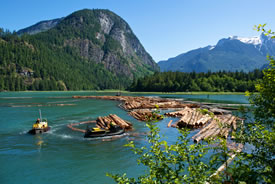British Columbia’s forest industry today

Orford Bay, BC (Photo courtesy of Interfor)
I grew up hiking and backpacking with my family in British Columbia’s woods. I chose to become a forester because of my inherent desire to take care of the natural environment; I wanted to contribute to the thoughtful management of our amazing forests.
I followed my Dad into the forest industry more than 10 years ago. I’ve worked in BC’s Interior and on the coast, in manufacturing and in woodlands. For the last year I’ve had my dream job — working with First Nations communities on the BC Coast.
Last month, I talked about British Columbia’s forest industry today as part of a multi-disciplinary panel at the Nature Conservancy of Canada's Why Forests Matter event in Vancouver, sponsored by TD Forests. It gave me a chance to share my passion for our forests and my desire to contribute to a sustainable forest industry.
My enthusiasm and passion seemed to have caught some by surprise. Yet I am far from alone. Our industry is packed with individuals who are proud to be responsible stewards for the forests and are committed to a sustainable, principled approach to timber harvesting.
When I graduated from Thompson Rivers University in 2009, I joined an industry that was sustainable and inclusive. I have always been supported by my employer to make independent professional decisions, even when it has meant trading profit for other forest values.
I believe BC’s forest industry is on the right path; there will always be room for improvement but I can say with conviction that we have come a long way. The industry has learned a lot along the way and understands the importance of delivering broad economic benefits and sound land stewardship. Much of this is supported through leading-edge science and forest management. Today, the BC industry is a world leader in forest certification and in advanced wood technology, and our building products are the sustainable solution for the future.
One of the best things about the panel discussion was the opportunity to share views — to listen and learn from each other. This is how the best ideas and solutions are born. Take, for example, how industry and environmental groups were able to come to agreement on ecosystem-based management in the Great Bear Rainforest.
Fourteen years ago, they had divergent views, it seemed they would never see eye to eye. Yet earlier this year they were able to recommend an approach that will maintain a healthy environment and economy in this unique area.
Another example of the positive evolution of our industry, and one that has a lot of meaning for me personally, is the increasing understanding, importance and respect for aboriginal rights and aboriginal culture. It is a privilege and an honour for us to develop strong relationships with First Nations and learn from their knowledge, stories and values. As the stewards of their territories, they have a unique connection and understanding of sustainable management that is helping to shape our practices.
More than a century ago, the forest industry established British Columbia’s economic foundation. Today, it provides the jobs and taxes that help us maintain a great standard of living. This industry contributed $11.7 billion to our economy last year, with $2.8 billion in wages and salaries for 58,000 people. That’s just direct employment. Add in indirect employment and the total is 170,000.
And there are plenty of challenging career opportunities — in mills, in the forest and in offices. Studies predict that through 2022 the total number of job openings in BC’s forest sector resulting from growth, retirement and attrition will be close to 16,000.
I really enjoyed being in a room last November with such a range views. I greatly value the opportunity for us to really listen to one another’s interests and values. It’s these types of environments where we can challenge ourselves to be creative and work together to find solutions.
In the mix and mingle after the panel discussion, I was asked why I am so positive about forestry, our communities and our future. The answer is simple: I am committed to finding creative solutions that provide for a range of values and objectives. As long as I stay grounded in that commitment, I will gladly face the challenges that come from joint-problem solving. I believe that the strongest, most challenging disagreements are a product of our passion for the things that are most important to us.
When we can each step back and take the time to dig deeper and understand what exactly is driving each other’s passion, we will often find common interests and values. My goal is to find that common ground; to find that place from which we can go forward together. I want to be able to look back one day and say that I was part of the constructive process that generated a future of which we can all be proud.


